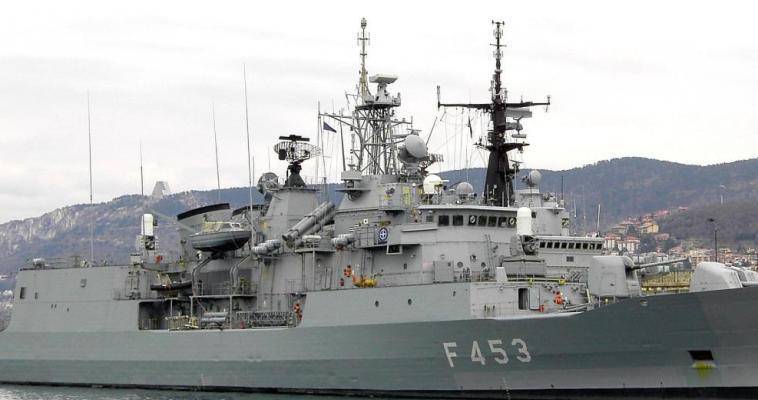Zacharias Michas: A military tug of war between Greece and Turkey in the Eastern Mediterranean
12/08/2020
The situation in the sea area where the Turkish fleet accompanying the research vessel “Oruc Reis” is moving in the Eastern Mediterranean has not changed. Turkey insists on displaying its flag in areas belonging to the “Greek continental shelf and the waters above” (!) in order to use the phrase Nikos Dendias coined for the descriptive reference to the EEZ.
At the same time, Turkey, through foreign minister Cavusoglu, is doing the only thing it knows: In continuing its escalation again, it is announcing the concession of “plots” at the western end of the sea area by the end of August, which the Turkish-Libyan memorandum seeks to “confiscate’, as well as the movement of the “Oruc Reis” outside the Greek island of Karpathos.
After all, the mission of the “Oruc Reis” is not to carry out serious seismic investigations, but to create a political fait accompli. For this purpose, it will be sent to the now demarcated Greek continental shelf. This may be done to return to the diplomatic process, but at the expense of a new Turkish fait accompl.
At the same time, behind-the-scenes diplomatic efforts are under way to de-escalate the situation and bring the two sides back to the negotiating table. According to reports from reputable media, Athens is said to have the support of the United States, which finds provocative (therefore illegal?) Turkish actions, as reflected in the State Department’s position on the issue, as expressed a short while ago.
However, the issue is more complicated. The outlook does not seem optimistic. Greece does not deny appealing to the International Court of Justice to resolve the issue. The appeal, however, presupposes the signing of a joint statement by the parties involved. Turkey, however, has declared its intention to place all its claims against Greek sovereignty in the context of negotiations for the signing of a joint statement, thus undermining the process.
What will Greece’s allies do?
In the most extreme imprint of the impasse, for Greece it is inconceivable to put in the judgment of anyone whether inhabited Greek islands should remain in Greece or be given to Turkey! Consequently, the only case that Greece would appeal to international justice would be the delimitation of the continental shelf-EEZ, without Turkish territorial claims, or the delimitation of the continental shelf-EEZ in the area of the arc Kastellorizo-Rhodes-Karpathos-Kasos-Crete.
Turkey is aware that its position is outside international law. For this reason it does not want the problem to be judged by a court, but in the field of force. If it did not want to, it would not follow the path of military coercion. Turkey’s goal is to put Greece on the negotiating table under a regime of extrortion and to extract most of those it claims, with Greek consent, as this consent would be used to disguise and legitimize its illigetimacy.
Greece’s military response effectively invalidates the Turkish strategy. However, it can not inactivate Turkey’s “Plan B”, ie short-circuit any attempt to exploit the region’s hydrocarbon deposits, which are an important part of Turkey’s incentive to engage the military tool. Greece may enjoy US support and the illegal nature of Turkish actions may be recognized, but the big question is what will the countries friendly to Greece do, if and when it is not possible to bring Turkey back to the diplomatic process.
Negotiations
A second question is what these countries will do if the two sides resume negotiations. Given that Turkey categorically denies the islands the right to have an EEZ, how likely is it that Western pressure will turn to Athens to make concessions for a division that will temporarily satisfy Ankara?
Prime Minister Kyriakos Mitsotakis has already called NATO’s equal distance tactics unacceptable, while Greek diplomacy requested the convening of the EU Council of Foreign Ministers. Obviously, the Greek side will insist that the Greek maritime zones are also European, while the hydrocarbons that will be identified are intended to meet the needs of the European market.
The point is that the Turks, with each passing day, prove through their behavior that the only language they know is the language of power. The strong Greek stance may be welcomed as a means of curbing Turkish aggression, but it is not enough.
If Greece does not want to be fooling itself, it must recognize two simple realities. The first is that Turkey, by maintaining the tension on the military level, seeks to wear down the Greek armed forces, through the prolonged operational involvement mainly of the Navy. It is well aware of the more than ten years of Greek inaction in the defense sector, as well as its consequences.
At the same time, Ankara may see a change in Greece’s military stance, but continues to assess that it is unlikely that the Greek leadership will decide to “push the button”. If, however, Greek sovereign rights are violated, this decision would be the only one that could prevent an endless descent.
Obviously, this is a decision that involves great risk and cost. To be, however, out of a list of options of the Greek side, means essentially a Greek defeat without a battle. Time is running out for Greece until decisions are made on the immediate and drastic reinforcement of the Greek armed forces. Erdogan must be convinced that he and Turkey have much more to lose if they get involved in a conflict with Greece. His aggressive stance with the constant escalation may be aimed at masking this very anxiety.





